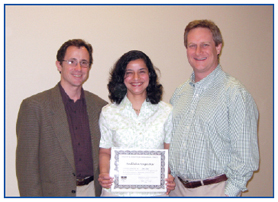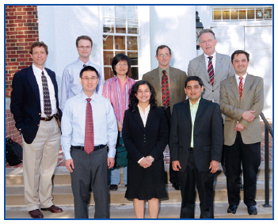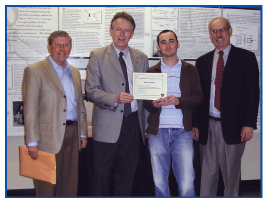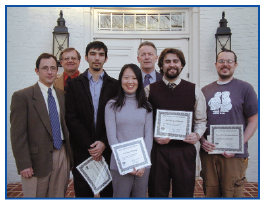|
Our graduate program in the Department of Chemistry & Biochemistry has continued to thrive. We currently have 145 graduate students in our graduate programs. The Department awarded 1 M.A., 3 M.S. and 19 Ph.D. degrees in the past academic year. These students provide the backbone of our Department faculty’s research program. Of course the two go hand-in-hand, and when one does well, so does the other. As mentioned in the letter from the Chair, our Department’s research efforts are noteworthy. Much of the research that our students are doing has become more and more multidisciplinary.
We recruited a larger than average class of students for our Ph.D. program. The recruiting year started with a larger than average number of applications, with over 300 applicants. Our Teaching Assistantship and Fellowship (TAF) committee worked hard to select a terrific crop of students coming this year that include 32 new Ph.D. graduate students and 2 students that will work toward their M.A. degree. Following the trend of recent years, we again had a successful graduate student recruiting weekend. Of the 21 prospective students that visited our Department, 14 of them accepted our offer. A large part of our success in recruiting great students has been an ever increasing involvement of current students, as well as faculty, in the recruiting process.
The 43rd Glenn S. Skinner Award was presented to Radika Nagarkar, who is working with Professor Joel Schneider. This prestigious award ($2500) is presented each year to the student in our Ph.D. program who is deemed to have contributed the most to the Department in each important area: scholarship, research, teaching and service to the Department. In the competitive selection of this award, Ms. Nagarkar was noted for her breadth of collaborative and independent research projects started, and in most cases completed. The award is named in honor of Professor Glenn S. Skinner, who was an active member of the University’s Chemistry faculty from 1928 to 1958.

From left to right: Professor Brian Bahnson, Radika Nagarkar and Professor Joel Schneider
The 27th annual Elizabeth Dyer Excellence in Teaching Awards were presented to four outstanding graduate student teaching assistants: Brad Bauer, David Gerstenhaber, Bayrammurad Saparov and
Xiaochun Zhang. Brad received his bachelor’s degree from Desales University and is currently working on his doctorate in the laboratory of Professor Sandeep Patel. Brad served as a TA in CHEM-445, Physical Chemistry, during the fall of 2007. David received his bachelor’s degree from the University of New Hampshire and is currently working on his doctorate in the laboratory of Professor Douglass Taber. David served as a TA in CHEM-333, Organic Chemistry, during the fall of 2007 and CHEM-334, Organic Chemistry, during the spring of 2008. Bayrammurad (Bayram) received his bachelor’s degree from Moscow State University in Russia and is currently working on his doctorate in the laboratory of Professor Svilen Bobev. Bayram served as a TA in CHEM-111 during the fall of 2007. Xiaochun received her bachelor’s degree from Peking University in China and is currently working on her doctorate in the laboratory of Professor Andrew Teplyakov. Xiaochun served as a TA in CHEM-103H, Honors General Chemistry, during the fall of 2007 and in CHEM-104H, Honors General Chemistry, during the spring of 2008. The Dyer Award honors the memory of Professor Elizabeth Dyer, a member of the Chemistry and Biochemistry faculty from 1933-1971.
The 36th annual Joel L. Silver Award Symposium was held May 21, 2009. This annual competition encourages the development of our graduate students’ ability to communicate the results of their scientific research. Eleven participants presented 15 min research talks, followed by a 5 min question and answer period. All of the talks at this year’s symposium were fantastic, making the jury’s task to choose a winner very difficult. We extend our sincere appreciation to this year’s Silver Symposium jury: Professor Peter Graham, Saint Joseph University (Inorganic), Professor Bill Malachowski, Bryn Mawr College (Organic), Professor Raul Lobo, Chemical Engineering (UD) (Physical), and Professor Jung-Youn Lee, Plant and Soil Sciences (UD) (Biochemistry). Radhika Nagarkar (Prof. Schneider) won 1st place for her presentation titled “De novo Design of Strand Swapped Beta-Hairpin Hydrogels”, which included a $300 award. We had two presenters tie for 2nd place and a $75 award: Subhendu Chakraborti (Prof. Bahnson) presenting “Structural Enzymology of Senescence Marker Protein-30 (SMP30): X-ray Crystallography, Mutagenesis and Kinetic Studies” and Shangjin Sun (Prof. Polenova) presenting “NMR Studies of CAP-Gly Domain of Mammalian Dynactin and its Interaction with Microtubules”. The other presenters, all impressive, were: Aaron Lee (Prof. Zondlo), Molly O’Hagan (Prof. Riordan), Vamsi Kodali (Prof. Thorpe), Liu Yang (Prof. Doren), Anastasia Fuzaylova (Profs. Bahnson and Colman), Na Guo (Prof. Doren), John Young (Prof. Theopold) and Piyal Ariyananda (Prof. Riordan).
|

From left to right (front): Shangjin Sun, Radika Nagarkar and Subhendu Chakraborti From Left to right (back): Professor Peter Graham (Saint Joseph University), Professor Bill Malachowski (Bryn Mawr College), Professor Jung-Youn Lee [Plant and Soil Sciences (UD)], Professor Brian Bahnson, Professor and Chair Klaus Theopold and Professor Raul Lobo [Chemical Engineering (UD)]

Seminar Speaker; Professor Maurice Brookhart (University of North Carolina, Chapel Hill ), Professor and Chair Klaus Theopold, Trofimenko Award Recipient Wesley Monillas and Colloquium Speaker; Professor John E. Bercaw (California Institute of Technology)
The 2nd annual Trofimenko Memorial Prize was awarded to Wesley Monillas, who works with Prof. Theopold. This $500 award, in memory of Dr. Swiatoslaw ‘Jerry’ Trofimenko, creator of the polypyrazolylborate ligand system and visiting scholar in the Department from 1996 until his death in 2007, is given annually to a graduate student in the Department who has distinguished him/herself in the area of ‘creative inorganic synthesis’.

From left to right(front): Professor Brian Bahnson, Bayrammurad Saprov, Xiaochun Zhang, Brad Bauer and David Gerstenhaber From Left to right (back): Professor John Burmeister and Professor and Chair Klaus Theopold
The inaugural recipient of the Brennie E. Hackley, Jr. Award for Excellence in Research was Juan Carlos Rodriguez-Reyes who works with Prof. Teplyakov. This $2000 award is given to a graduate student who has demonstrated excellence in research. It honors the memory of Dr. Brennie E. Hackley, Jr. (UD Ph.D. ’57), who devoted his remarkable 57-year career at the Edgewood Chemical and Biological Center, Aberdeen, MD Proving Grounds to the development of medical antidotes to chemical warfare agents.
The University of Delaware awards a limited number of graduate student fellowships that include stipend support. This year our Department did quite well in this competitive selection process. Kathryn Perrine (Prof. Teplyakov) and Bayrammurad Saparov (Prof. Bobev) were granted a University Graduate Fellows award this year, and Jayme Wildin (Fall 2009) will be supported for her first year in our Ph.D. program as a University Graduate Scholar.
In addition to Departmental and University awards, special recognition goes out to Laurel Kegel (Prof. Booksh) who has been awarded the Great Rivers Affiliate Predoctoral Fellowship by the Research Committee of the American Heart Association. This highly competitive national award will support Laurel’s stipend for 2 years.
I would like to thank our current Chair, Professor Klaus Theopold, for initially having the confidence in appointing me to the position of Director of Graduate Studies for the department, and over the last year, working with me to advance our graduate program. A special thanks also goes out to Professor Andrew Teplyakov, who formerly filled this position and has been instrumental in helping me to adjust to the job. I need to acknowledge the tireless efforts of the previously mentioned TAF Committee, as well as the Graduate Curriculum (GCC) Committee. Furthermore, a large group of faculty, current students and staff, who, for now, will remain nameless, deserve considerable praise for their efforts to make our Department a successful and interesting place to learn and do cutting edge research. Finally, I would be remiss if I didn’t applaud the efforts of Jen Durkin and Susan Cheadle for their work with prospective and current graduate students in our program. Their continuous and superb work makes all of our lives a lot easier in the Department. I look forward to the remaining two years of my term to continue to grow and improve our graduate program.
Best wishes,
Brian Bahnson
|